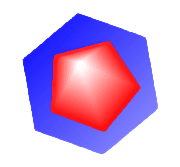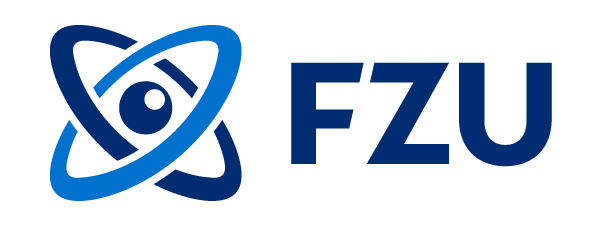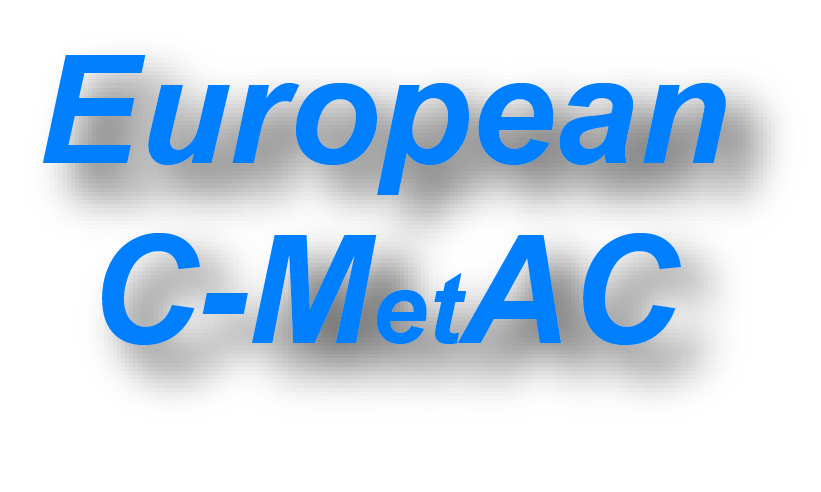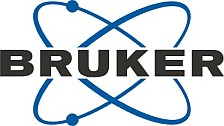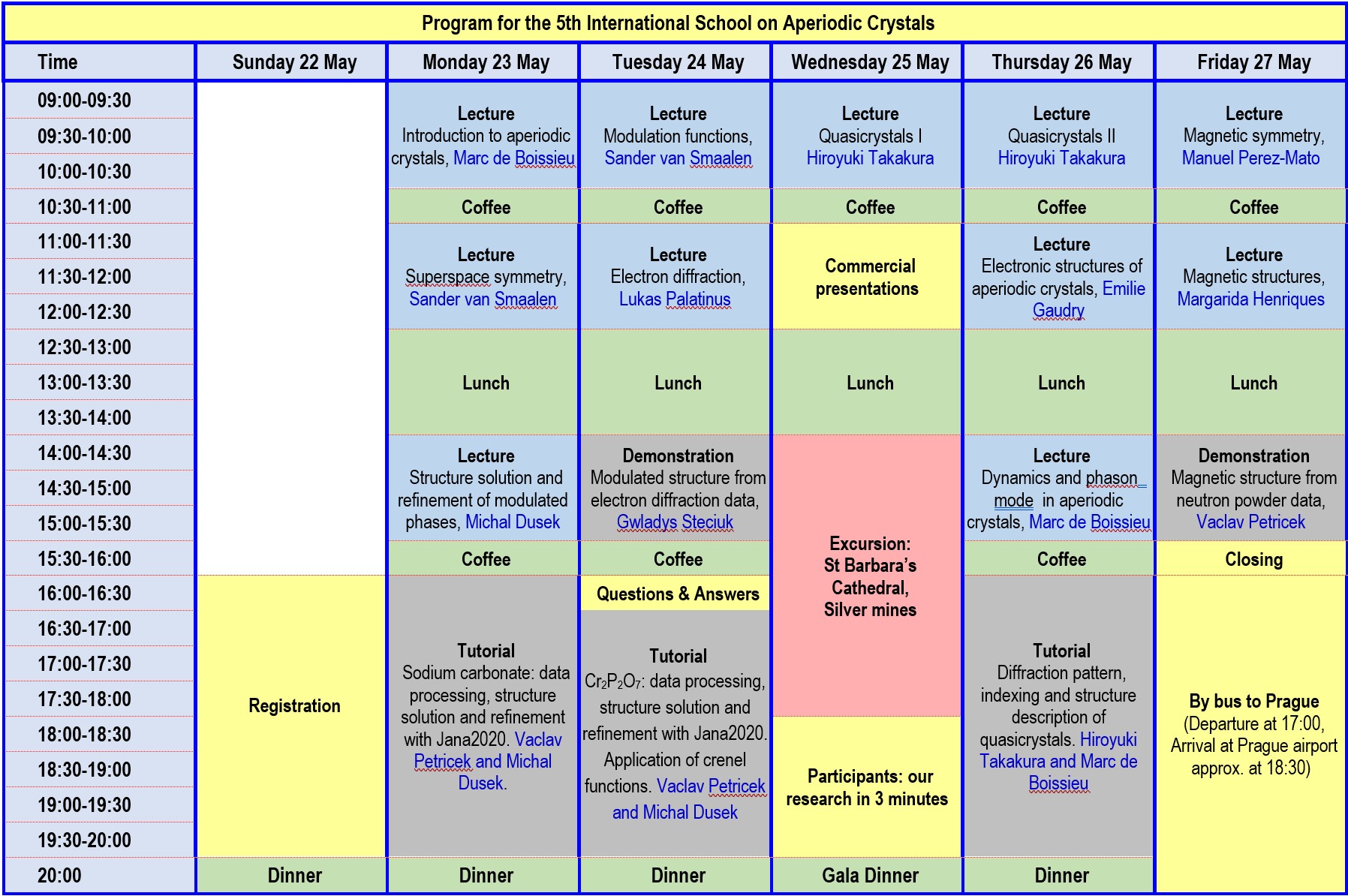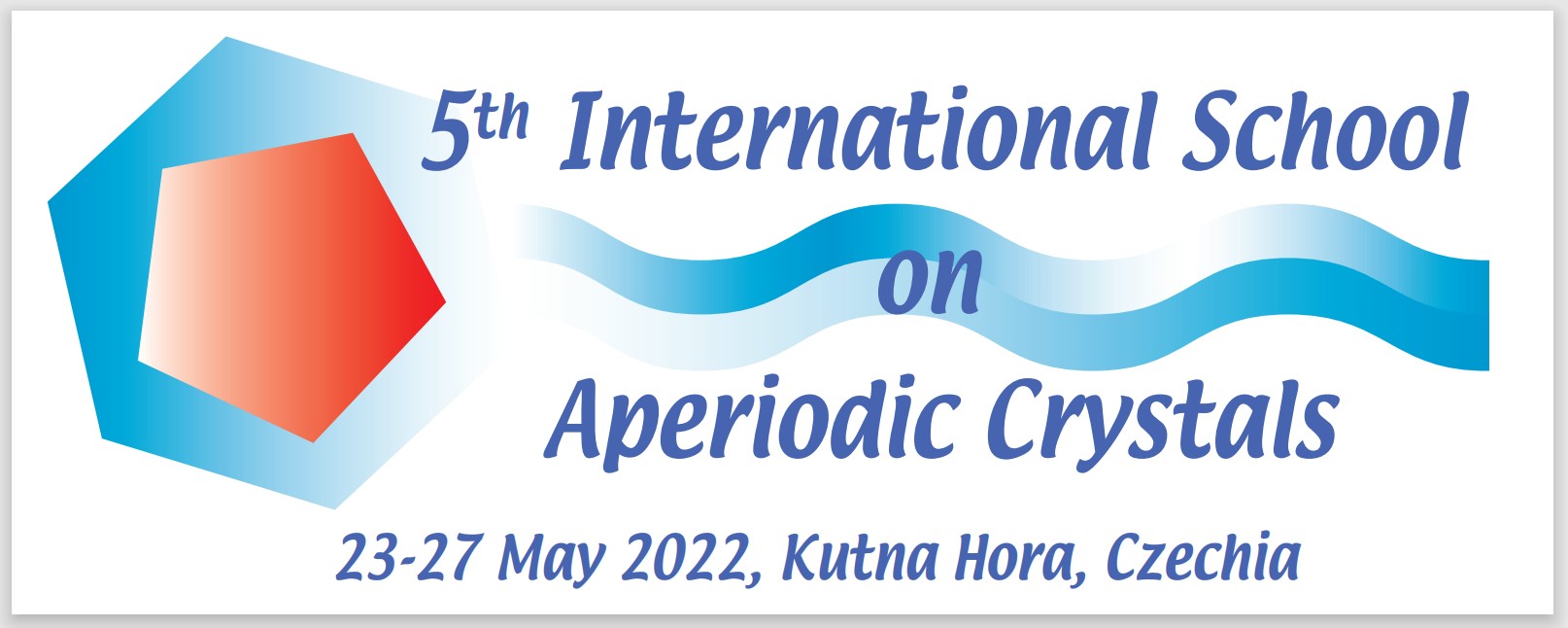
Presentation
Aperiodic crystals are long range ordered structures which lack translational invariance.
They are found in a large variety of systems (minerals, organic compounds, single element
under pressure, oxides, ferro-electrics, intermetallic compounds) and encompass
incommensurately modulated structures, incommensurate composites and quasicrystals.
The structure determination of aperiodic crystals and the influence of the aperiodic order
on their physical properties have made tremendous progress in recent years. However the high
dimensional description and superspace approach used to describe the atomic structure of aperiodic
crystal remain difficult to grasp for the non specialist.
This is why the Commission on Aperiodic Crystals
of the International Union of Crystallography (IUCr) has decided to organize a school on Aperiodic
Crystals.
The targeted audience is clearly a non-specialist one: Phd students or experienced scientists
working in the field of crystallography, chemistry, material science or solid state physic and
willing to have a basic understanding of aperiodic crystals.
The school will be organized on 5 days in Kutna Hora, a historical town located 80 km east of Prague.
Experts in the field of aperiodic crystal will give lectures and organize tutorials on a step by step basis
for each class of aperiodic crystals. Various examples will then be presented, together with overviews
on phase transitions, phonon and phasons, simulations and aperiodic crystal stability.
Number of participants will be limited to 40.
School location
The school will take place in
Kutna Hora,
a historical town 80 km from Prague.
The weather is expected to be nice and mild at this season. Housing will be on-site
in a hotel
U Kata.
Access and practical details:
The school site is easily accessible by train or bus from Prague, see IDOS web
The school site is easily accessible by train or bus from Prague, see IDOS web
Organisers
IUCr commission on Aperiodic crystals, Czech and Slovak Crystallographic assotiation, and
Institute of Physics of the Czech Academy of Sciences.
Commitees
Program Commitee: Michal Dusek, Vaclav Petricek, Marc de Boissieu, Emilie Gaudry
Organizing Commitee: Michal Dusek, Radek Kuzel
Organizing Commitee: Michal Dusek, Radek Kuzel
Sponsors
Rigaku Innovative Technologies Europe s.r.o., E-CMetAC - European Integrated Center for the Development of Metallic Alloys & Compounds,
International Research Network IRN-aperiodic. Bruker.
Confirmed lectures with draft titles
Emilie Gaudry - Electronic structure of aperiodic crystals
Marc de Boissieu - Introduction to aperiodic crystals
Marc de Boissieu - Dynamics and phason mode in aperiodic crystals
Sander van Smaalen - Superspace symmetry
Michal Dusek - Structure solution and refinement of modulated phases
Sander van Smaalen - Modulation functions
Lukas Palatinus - Electron diffraction
Manuel Perez-Mato - Magnetic symmetry
Margarida Henriques - Magnetic structures
Felix Hennersdorf - (commercial) Rigaku Advances in X-Ray and electron crystallography
Tutorials and demonstrations
Jana2020 Tutorial - Sodium carbonate: data processing, structure solution and refinement with Jana2020
Jana2020 Tutorial - Cr2P2O7: data processing, structure solution and refinement with Jana2020. Application of crenel functions
Quasicrystals Tutorial - Diffraction pattern, indexing and structure description of quasicrystals
Demonstration - Modulated structure from electron diffraction data
Demonstration - Magnetic structure from neutron powder data
Topics DRAFT
Introduction to crystallography of aperiodic crystals
Incommensurately modulated crystal
Superspace symmetry and superspace groups
Composite structures
Incommensurately modulated crystal
Superspace symmetry and superspace groups
Composite structures
Introduction to quasicrystals
Aperiodic tilings
Decagonal quasicrystal structure determination Icosahedral Quasicrystals
Aperiodic tilings
Decagonal quasicrystal structure determination Icosahedral Quasicrystals
Introduction to magnetic structures
Magnetic symmetry
Magnetic symmetry
Applications and physical properties
Registration and deadlines
Pre-registration: by e-mail to dusek@fzu.cz. Deadline 15 April 2022.
Registration: follow instructions obtained after pre-registration. Deadline 15 May 2022.
Warning: only 40 places available!!
Registration: follow instructions obtained after pre-registration. Deadline 15 May 2022.
Warning: only 40 places available!!
Registration fees. Registration fees are all inclusive, i.e. they include the school fee,
the cost of the hotel and full board,
the stay expenses, the gala dinner and excursion. The arrival is on Sunday 22 May
2022 from 16h and departure on Friday 27 May 2022 afternoon. Housing will be in a
3 star type hotel on the basis of double occupancy at request
and single occupancy for other cases.
Young Scientists fee: 150 €. Young scientists are graduate students, post-graduate students
or post-doctoral fellows with a maximum age of 35.
Senior scientists fee: 400 €.
Retired scientists: free.
Pre-registration, registration and payment.The registration is in two steps.
First pre-register by e-mail to Michal Dusek, dusek@fzu.cz. Please mention if you are a young scientist
(see the definition above) or retired.
After a few days, you will receive a confirmation and a link to proceed for final registration.
Payment can be made by Credit Card (preferred), bank transfer or invoice.
Support from sponsors. Limited budget is available from our sponsors for travelling support and registration fee waivers. Young scientists
applying for this support should send their CV, motivation letter and supporting letter from their supervisor as a part of their pre-registration.
Other scientists should explain why they need the travelling support or registration fee waiver.
Pandemic planning. The School is planned as a classical in-person event. In case of bad epidemic situation, we will
change to on-line event and registration fees will be returned.
Pre-registrations (limit 40):
| 1 | Igor Plokhikh, Villigen, Switzerland |
| 2 | Jan Langmann, Augsburg, Germany |
| 3 | Miroslava Litecka, Rez, Czechia |
| 4 | Liam Chandler, Liverpool, UK |
| 5 | Srinivas Mandyam, Cambridge, UK |
| 6 | Edi Topic, Zagreb, Croatia |
| 7 | Mirta Rubcic, Zagreb, Croatia |
| 8 | FREE |
| 9 | Joze Luzar, Ljubljana, Slovenia |
| 10 | Harshit Agarwal, Bayreuth, Germany |
| 11 | Andrea Jelen, Ljubljana, Slovenia |
| 12 | Jhuma Sannigrahi, Goa, India |
| 13 | Mark Baranov, Negev, Israel |
| 14 | Cintli Aguilar Maldonado, Caen, France |
| 15 | Olivier Renier, Amsterdam, The Netherlands |
| 16 | Parul Devi, Dresden, Germany |
| 17 | Joachim Ballman, Heidelberg, Germany |
| 18 | Petr Vertat, Praha, Czechia |
| 19 | Toms Rekis, Riga, Latvia |
| 20 | Toni Schmeida, Dresden, Germany |
| 21 | Bezzerga Djamel, Relizane, Algeria |
| 22 | Somnath Dey, Aachen, Germany |
| 23 | Patrick Kruszon-Oeffner, New York, USA |
| 24 | Roman Pereire, Bordeaux, France |
| 25 | FREE |
| 26 | Laura Bereczki, Budapest, Hungary |
| 27 | Wilder Carrillo-Cabrera, Dresden, Germany |
| 28 | FREE |
| 29 | Patrick Schmidt, Tuebingen, Germany |
| 30 | Tomasz Poreba, Grenoble, France |
| 31 | Cinthia Antunes Correa, Prague, Czechia |
| 32 | Srikanta Goswami, Prague, Czechia |
| 33 | Elena Solana-Madruga, Madrid, Spain |
| 34 | Sandy AL Bacha, Lille, France |
| 35 | Glen Hebberd, Durham, UK |
| 36 | Ram Mohan T. Vallinayagam, Tirunelveli, India |
| 37 | Marcin Swiatkowski, Lodz, Poland |
| 38 | Igor Antunes Vogel Maldonado, Rio de Janeiro, Brazil |
| 39 | Vasily Lebedev, Limerick, Ireland |
| 40 | FREE |
| 41 | Surya Rohith Kotla, Bayreuth, Germany |
| 42 | Wilfried BAJOUN Mbajoun, Nancy, France |
| 43 | Juraj Kuchar, Kosice, Slovakia |
| 44 | Maxime Le Ster, Lodz, Poland |
| 45 | Stefan Schwarzmuller, Innsbruck, Austria |
| 46 | Jakub Obuch, Prague, Czechia |
| 47 | Rachida Oubouaza, Casablanca, Morocco |
| 48 | Morgane Poupon, Prague, Czechia |
| 49 | Thomas Emge, New Brunswick, USA |
| 50 | Toni Grell, Milan, Italy |
| 51 | Alessia Provino, Genova, Italy |
| 52 | Yu-Chin Huang, Uppsala, Sweden |
| 53 | Krishna Kant Dubey, Varanasi, India |
| 54 | Julia Hubner, Lund, Sweden |
| 55 | Tatsuya Kato, Grenoble, France |
| 56 | Sivaprasad Ghanta, Stockholm, Sweden |
| 57 | Olha Sichevych, Dresden, Germany |
| 58 | Lev Akselrud, Dresden, Germany |
| 59 | Stanislav Savvin, Grenoble, France |
| 60 | Cheng Yang, Warzsaw, Poland |
| 60 = the full capacity of the lecture room |
IUCr Scientific Freedom Policy Statement. The Organizing Committee of the International School on Aperiodic
Crystals shall observe the basic policy of non-discrimination and affirms the right and freedom of scientists to associate in
international scientific activity without regard to such factors as ethnic origin, religion, citizenship, language,
political stance, gender, sex or age, in accordance with the Statutes of the International Council for Science.
At this International school no barriers will exist which would prevent the participation of bona fide scientists.


